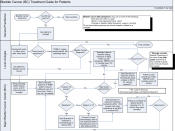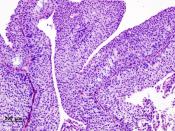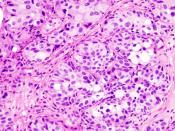INTRODUCTION
The death rate from bladder cancer has slowly been declining over the last two decades due to improved therapy and the increasing understanding that researchers are developing concerning the intricacies of this disease (1). There are several types of bladder tumors and they can be grouped based on the way that they appear under a microscope (2). The four main types of cancers that affect the bladder are:
1. urothelial carcinoma or transitional cell carcinoma (TCC)
2. squamous cell carcinoma
3. adenocarcinoma and
4. small cell (2).
These types of cancer cells can also grow in the lining of the kidney, the ureters and the urethra. Urothelial cells line the bladder and urothelial (transitional cell) carcinoma is the most frequent form of bladder cancer (2). Only about 4 percent of bladder cancers are squamous cell carcinomas. Under a microscope, these cells look very much like cells from skin cancers (2).
Only about 1 to 2 percent of bladder cancers are adenocarcinomas and these cells are similar to the gland-forming cells of intestinal cancers.
The body is composed of tiny cells, which normally repair and reproduce in a controlled process. With cancer, this process goes wrong and cells can divide and grow in an uncontrolled way, causing a lump or a tumor on or within the part of the body affected. If this tumor contains cells that are able to invade neighboring tissues or organs, it is known as malignant, if not it is termed benign. Bladder cancer usually forms from the cells inside the bladder. It is mainly a disease of older people. Half of bladder tumors occur in people over the age of 70 and the disease is very rare in people under 40 years of age.
The exact causes of bladder cancer are not entirely...


